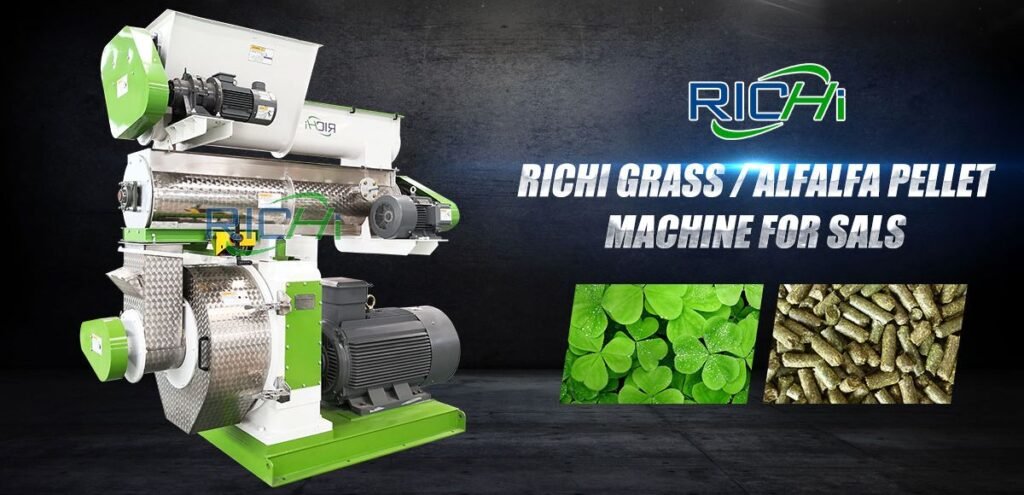Durability is a crucial factor influencing the overall cost and long-term value of Alfalfa Pellet Machines. As these machines are a significant investment, their longevity impacts the return on investment (ROI) and operational efficiency. Here’s how the durability of these machines affects their cost, considering various factors such as initial investment, maintenance expenses, operational efficiency, and long-term economic benefits.
Initial Investment and Quality
- Premium Materials: Durable machines are constructed with high-grade steel and wear-resistant components, which increases their initial cost. However, these materials contribute to a longer service life.
- Advanced Engineering: Machines designed with robust engineering and precision are typically more durable but come at a higher manufacturing cost.
- Brand Reputation: Established brands known for their durable equipment often have higher prices due to their proven reliability and performance.
Although the initial investment for a more durable machine may be higher, it often results in lower total cost of ownership over time.
Maintenance Costs and Frequency
- Reduced Wear and Tear: Durable machines experience less frequent breakdowns, leading to lower repair costs and reduced need for replacement parts.
- Extended Service Intervals: High-quality machines often require maintenance less frequently, which lowers labor and downtime costs.
- Parts Longevity: Durable machines use high-quality components that last longer, reducing the frequency of replacements and associated costs.
For instance, a machine with hardened die and roller components might cost 20-30% more initially but could extend the replacement interval by 50-100%, resulting in substantial savings.
Related post: https://www.richipelletmachine.com/alfalfa-pellet-production-line/
Operational Efficiency and Productivity
- Consistent Output: Durable machines maintain their production capacity over time, ensuring stable output and quality.
- Reduced Downtime: Less frequent breakdowns lead to more operational hours and increased productivity.
- Energy Efficiency: Durable machines often retain their energy efficiency longer, helping to keep operational costs stable.
A machine that performs efficiently over an extended period can produce more pellets per unit of energy, directly impacting profitability.
Long-Term Economic Benefits
- Extended Lifespan: A durable machine might operate effectively for 10-15 years, compared to 5-7 years for a less durable alternative.
- Higher Resale Value: Well-maintained, durable machines retain their value better, offering better returns if sold or traded.
- Improved ROI: A longer operational life allows businesses more time to recoup their initial investment and generate profits.
For example, a durable machine costing $100,000 with a 15-year lifespan may offer better value than a $70,000 machine that needs replacement after 7 years, considering maintenance and operational costs.
Impact on Product Quality
- Consistent Pellet Size: Durable machines maintain precision over time, producing uniform pellets.
- Stable Density: Robust pressing mechanisms ensure consistent pellet density, essential for feed quality.
- Reliable Performance: Consistent machine performance leads to predictable product quality, which is valuable for maintaining customer satisfaction and market reputation.
High-quality pellets can command premium prices, which can offset the cost of a more durable machine.
Adaptability and Future-Proofing
- Upgradability: Well-built machines often allow for easier upgrades or modifications to meet evolving production needs.
- Compatibility with New Technologies: Durable machines from reputable manufacturers are more likely to be compatible with future technological advancements.
This adaptability can extend the useful life of the machine, further improving its cost-effectiveness.
Environmental and Sustainability Considerations
- Reduced Waste: Longer-lasting machines result in fewer replacements, reducing environmental impacts related to manufacturing and disposal.
- Energy Efficiency Over Time: Durable machines maintain energy efficiency longer, contributing to reduced carbon footprints and energy costs.
These factors can be particularly important for businesses focused on sustainability, offering marketing advantages and aligning with environmental regulations.
Conclusion
The durability of Alfalfa Pellet Machines plays a significant role in determining their overall cost and value. While more durable machines typically come with a higher initial price, they often offer superior long-term economic benefits through reduced maintenance costs, improved operational efficiency, and an extended lifespan.
When evaluating the cost of an Alfalfa Pellet Machine, it’s essential to consider not just the initial purchase price but also the total cost of ownership over the machine’s lifetime. Factors such as maintenance requirements, operational efficiency, product quality, and adaptability all contribute to the true cost and value of the machine.
Investing in a durable, high-quality machine can lead to improved profitability, more consistent product quality, and better long-term sustainability. As the industry evolves, the importance of durability in equipment selection is likely to grow, making it a key consideration for forward-thinking agricultural businesses.

